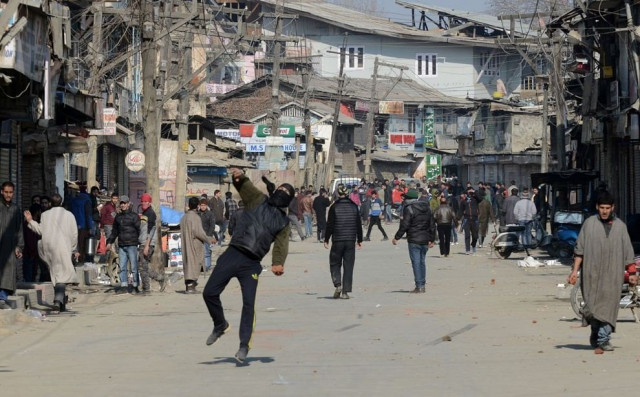Voicing concern: India accused of changing Kashmir’s demography
Foreign secretary says BJP govt encouraging non-state subjects to settle in Kashmir to reduce Muslim majority

Foreign secretary says BJP govt encouraging non-state subjects to settle in Kashmir to reduce Muslim majority. PHOTO: AFP
Pakistan has accused India of encouraging ‘non-state subjects’ to settle in the Indian half of the disputed Himalayan state of Kashmir in an attempt to turn the Muslim majority in the region into a minority.
Briefing the envoys of Organisation of Islamic Cooperation (OIC) member countries in Islamabad on Wednesday, Foreign Secretary Aizaz Ahmed Chaudhry expressed concern over the policies of the Bharatiya Janata Party (BJP) government on Kashmir.

An official statement issued after the briefing quoted Aizaz as saying that the BJP government’s policies were aimed at altering the demographic makeup of Jammu and Kashmir by settling non-state subjects in the region in order to turn the Muslim majority there into a minority and dividing the population along ethnic, religious and communal lines.
Secretary Aizaz highlighted the brutalities committed by Indian security forces in Indian-administered Kashmir to suppress the indigenous Kashmiri movement against Indian rule and brought up the staggering figures of Kashmiri residents killed, women widowed and dishonoured, and children orphaned as a result of gross human rights violations.
“No elections in Indian Kashmir can be a substitute for a plebiscite under the auspices of the United Nations,” the statement quoted him as saying.
Aizaz said peace in the region would remain elusive without the resolution of the Kashmir dispute in accordance with the UN resolutions that call for a free and fair plebiscite to determine the wishes of the people of Jammu and Kashmir.
He mentioned that the Kashmir Solidarity Day is commemorated by the government and people of Pakistan, at home and abroad, to express solidarity with and to reiterate Pakistan’s political, moral and diplomatic support to the Kashmiris in their struggle for their right to self-determination. Talking about the OIC secretary general’s recent visit to Pakistan, the foreign secretary deeply appreciated the consistent support of the OIC and its chief for the Kashmir cause.
Dialogue with India must include Kashmir: Sartaj
Adviser to the Prime Minister on National Security and Foreign Affairs Sartaj Aziz, meanwhile, said that any dialogue with India must include discussions on resolving the Kashmir dispute or the exercise would be futile.
During the question hour in the National Assembly on Wednesday, he said although there were reports that US President Barack Obama tried to persuade India to resume dialogue with Pakistan during his recent visit, New Delhi was unwilling to resume dialogue.
“New Delhi’s negative propaganda regarding the Line of Control is indicative of Indian intransigence and reluctance to resume dialogue,” he said, adding that “Pakistan wants meaningful and result-oriented dialogue with India for the resolution of all outstanding issues.”
The onus of resuming dialogue lies with India as it has ‘unnecessarily’ suspended the foreign secretary-level talks following Pakistan’s high commissioner meeting with Kashmiri leaders in New Delhi, he said, adding that Pakistan was working with other countries to press India into resuming talks, as “uninterrupted dialogue is necessary for regional peace, stability and development”.
Published in The Express Tribune, February 5th, 2015.



















COMMENTS
Comments are moderated and generally will be posted if they are on-topic and not abusive.
For more information, please see our Comments FAQ